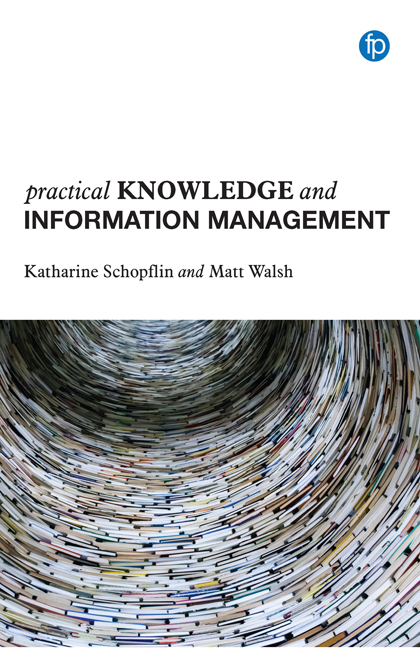Book contents
- Frontmatter
- Contents
- Case studies and sidebars
- 1 Introduction to knowledge and information management
- 2 Introducing knowledge and information management to organizations
- 3 Information management and governance
- 4 Communities and knowledge-sharing
- 5 Making knowledge explicit: knowledge bases, know-how and wikis
- 6 Capturing knowledge legacy: passing on staff knowledge
- Afterword: the future of knowledge and information management
- References
- Index
1 - Introduction to knowledge and information management
Published online by Cambridge University Press: 01 June 2019
- Frontmatter
- Contents
- Case studies and sidebars
- 1 Introduction to knowledge and information management
- 2 Introducing knowledge and information management to organizations
- 3 Information management and governance
- 4 Communities and knowledge-sharing
- 5 Making knowledge explicit: knowledge bases, know-how and wikis
- 6 Capturing knowledge legacy: passing on staff knowledge
- Afterword: the future of knowledge and information management
- References
- Index
Summary
While the special talent of the information professional will always be to connect users to the information or items they require, proactively or reactively, the actual work they carry out has changed considerably since the 1990s. Rather than being gatekeepers, they are now more likely to be advisers, interpreters, designers and trainers. In the library world ‘librarian’ is rare in job titles, particularly (but not exclusively) in the corporate or special library sector. Information professionals are increasingly involved with managing internal information in addition to connecting users to published resources. Meanwhile, records managers have moved from being the end-repository for corporate knowledge, instead frequently working with their colleagues to help them manage their own information from the moment it is created.
This book aims to provide a practical guide to knowledge and information management (KIM) for those working in organizations. It aims to complement the large body of management literature on the subject, and provide advice and best practice on the KIM work information professionals are required to do. As part of this, the authors have consulted professionals and reflected on their own experiences within the field. The book also aims to demonstrate new approaches to KIM and consider how developments may change its practice in the future.
Knowledge management (KM) emerged as a business practice in the 1980s.
It has never been a practice exclusive to the information profession. Its purpose has been to enable organizations to do whatever they do as best they can, by facilitating the organization and sharing of tacit and expressed knowledge. It is most often associated with corporate bodies. However, the authors believe it applies in any organization. A recent article (Daland, 2016) considered the benefits of KM to academic libraries, where providing access to published materials has traditionally been the central role of its service. Townley's 2001 article ‘Knowledge Management and Academic Libraries’ concluded that approaches from KM would benefit academic libraries. And the last part of Seely Brown and Duguid's The Social Life of Information (2002) showed presciently how academic learning is affected as much by institutional experience as by learning materials themselves. Perhaps because of their multiple missions and varied users, public libraries have found KIM less relevant.
- Type
- Chapter
- Information
- Practical Knowledge and Information Management , pp. 1 - 10Publisher: FacetPrint publication year: 2018



